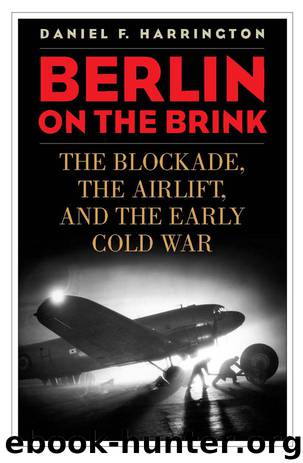Berlin on the Brink by Daniel F. F. Harrington

Author:Daniel F. F. Harrington
Language: eng
Format: epub
Publisher: The University Press of Kentucky
Published: 2012-04-28T16:00:00+00:00
CHAPTER 10
“Lieber Pomm als ‘Frau komm!’ ”
In addition to being a diplomatic struggle between East and West, the Berlin blockade was a political competition conducted in the streets of a proud but ruined city. Berlin’s residents were not spectators at a contest among foreign occupiers; they were participants. As Brian Robertson noted at the time, and as others have emphasized since, the West’s ability to stay in Berlin “depends in the final issue upon the morale of the population.”1
Myth and legend overlay our image of the blockade, making it difficult to see the city’s residents accurately. When we hear the word Berliners, we imagine an undifferentiated mass, solidly pro-Western, stoically enduring unprecedented hardship. The most familiar names are Ernst Reuter, Franz Neumann, Otto Suhr, and Ferdinand Friedensburg. Louise Schroeder would be a better choice, because the average Berliner was a woman.2 Economic and class differences mattered. Political opinions and intensity of commitment varied. The demands of daily life left little time for politics. And as one author suggested, “There was very little love for any foreigners in Berlin,” which was certainly true at the blockade’s beginning.3 Defeat and its aftermath had given Berliners little reason to be enthusiastic about anything. Wartime destruction and postwar dismantling had stripped the city of much of its industry, depriving thousands of their livelihood. Having requisitioned the best housing, the occupiers lived comfortably amid the city’s rubble. Violence and intimidation were not restricted to Red Army soldiers and the eastern sector, especially in the early years of the occupation. Anger and resentment over German women’s sexual relations with occupation soldiers were widespread.4
We tend to see conditions during the blockade as static, but in reality, they (and Berliners’ perceptions of them) fluctuated. Circumstances were easier at first—that is, when the blockade was not tightly enforced, gardens could supplement supplies, and people expected the crisis would soon end. Berliners tried to maintain a semblance of ordinary life, which was easier when unemployment remained near pre-blockade levels. Life became harsher as winter approached, darkness lengthened, unemployment rose, and the end of the crisis receded into the distant future. Anticipation made the autumn a more anxious time than winter itself, which proved unusually mild.
Download
This site does not store any files on its server. We only index and link to content provided by other sites. Please contact the content providers to delete copyright contents if any and email us, we'll remove relevant links or contents immediately.
The Radium Girls by Kate Moore(10935)
The Templars by Dan Jones(4202)
100 Deadly Skills by Clint Emerson(4098)
Rise and Kill First by Ronen Bergman(4032)
The Doomsday Machine by Daniel Ellsberg(3744)
The Rape of Nanking by Iris Chang(3537)
Killing England by Bill O'Reilly(3470)
Hitler in Los Angeles by Steven J. Ross(3457)
Stalin by Stephen Kotkin(3099)
12 Strong by Doug Stanton(3066)
Hitler's Monsters by Eric Kurlander(2742)
Darkest Hour by Anthony McCarten(2657)
Blood and Sand by Alex Von Tunzelmann(2617)
The Art of War Visualized by Jessica Hagy(2428)
Hitler's Flying Saucers: A Guide to German Flying Discs of the Second World War by Stevens Henry(2308)
The Code Book by Simon Singh(2223)
The Second World Wars by Victor Davis Hanson(2140)
Babylon's Ark by Lawrence Anthony(2079)
Tobruk by Peter Fitzsimons(2070)
